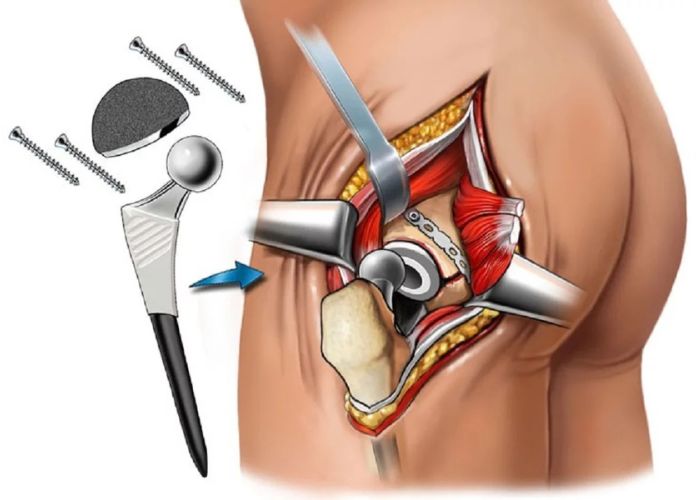
Book An Appointment
Hip Replacement Surgery
Hip pain, particularly due to arthritis or injuries, can significantly affect one’s quality of life. The hip joint, which connects the thigh bone (femur) to the pelvis, is a ball-and-socket joint that allows for a wide range of motion. However, over time, wear and tear or injury can damage the cartilage that cushions the joint, leading to pain, stiffness, and loss of movement. When conservative treatments such as pain medications, physical therapy, or injections fail to provide relief, hip replacement surgery is often recommended.
Hip replacement surgery, also known as hip arthroplasty, involves removing the damaged portions of the hip joint and replacing them with artificial components. The procedure can be a life-changing solution for individuals suffering from severe hip pain, helping them regain mobility, reduce pain, and improve their overall quality of life. Modern hip replacements are highly effective, with most patients experiencing significant relief from pain and restoration of hip function after surgery.
The surgery involves replacing the worn-out ball (femoral head) and socket (acetabulum) of the hip joint with prosthetic components made of metal, plastic, or ceramic. These artificial parts are designed to mimic the natural function of the hip joint. There are two main types of hip replacement: total hip replacement (THR), which replaces both the ball and socket, and partial hip replacement, which only replaces the ball portion of the joint.
How Dr. Nitish Kapil Helps with Hip Replacement Surgery
Dr. Nitish Kapil is an expert Orthopaedic surgeon specializing in hip replacement surgery, and his patient-centered approach ensures that individuals receive the highest quality of care. His experience and skill in the latest surgical techniques make him a trusted choice for those in need of hip replacement surgery. Here’s how Dr. Nitish Kapil helps resolve hip joint issues:
Comprehensive Diagnosis
Dr. Nitish Kapil begins with a detailed consultation to assess the severity of the hip problem. He reviews medical history, performs a physical exam, and uses imaging tests such as X-rays and MRIs to evaluate the damage to the hip joint. This helps in determining whether hip replacement surgery is necessary.
Personalized Treatment Plan
Once a diagnosis is made, Dr. Nitish Kapil tailors a treatment plan that suits the individual’s specific needs, activity level, and overall health. He discusses the benefits and risks of surgery and helps patients understand their options for hip replacement.
Minimally Invasive Techniques
Dr. Nitish Kapil utilizes the latest minimally invasive surgery techniques to reduce tissue damage, speed up recovery time, and minimize scarring. This approach involves smaller incisions and allows for a faster and less painful recovery.
Advanced Prosthetics
Dr. Nitish Kapil uses state-of-the-art prosthetics that are durable and designed to provide long-lasting results. These implants are customized to fit the patient’s anatomy for better function and comfort.
Post-Surgery Care and Rehabilitation
After surgery, Dr. Nitish Kapil works closely with physical therapists to design a rehabilitation program to restore strength, mobility, and flexibility to the hip joint. The goal is to help the patient return to their normal activities as quickly and safely as possible.
Ongoing Support
Dr. Nitish Kapil provides continuous care throughout the recovery process, offering follow-up appointments to monitor healing and address any concerns or complications. His goal is to ensure long-term success and prevent future issues with the hip joint.
With Dr. Nitish Kapil expertise, patients can expect a smooth journey from diagnosis to recovery, leading to a pain-free and active life after hip replacement surgery.
Symptoms That May Indicate the Need for Hip Replacement Surgery
- 1. Chronic hip pain that persists even with medication and other treatments
- 2. Difficulty walking, climbing stairs, or getting in and out of a chair or car
- 3. Limited hip movement and stiffness
- 4. Pain in the hip that worsens over time
- 5. Deformity in the hip joint or visible limping
- 6. Pain that interferes with sleep or daily activities
Solutions for Hip Joint Issues
Non-Surgical Treatments
For mild to moderate hip pain, Dr. Nitish Kapil recommends conservative treatments, including physical therapy, pain management with medications, and lifestyle modifications (e.g., weight management) to improve function and reduce discomfort.
Hip Replacement Surgery
When conservative methods fail to provide relief, hip replacement surgery is the most effective solution. By replacing the damaged joint with artificial components, the surgery alleviates pain and restores mobility.
Rehabilitation
Post-surgery rehabilitation is essential to ensure a full recovery. Dr. Nitish Kapil coordinates with physical therapists to create a personalized rehab plan that includes exercises to strengthen the hip muscles, improve flexibility, and restore movement.
Preventative Measures
After surgery, Dr. Nitish Kapil provides advice on maintaining hip health to prevent future joint issues. This includes guidance on proper exercise, weight management, and joint care practices to maintain mobility and prevent stress on the hip.
Dr. Nitish Kapil’s expertise in hip replacement surgery ensures that individuals suffering from hip joint pain can receive comprehensive treatment and enjoy a higher quality of life. His dedication to precision and care helps patients achieve long-term success and return to an active lifestyle.




